This is an archived article that was published on sltrib.com in 2015, and information in the article may be outdated. It is provided only for personal research purposes and may not be reprinted.
Michael Barney remembers Dec. 15, 2012, with relief instead of grief because of his family's habit of always wearing seat belts.
The car carrying him, his wife and their three daughters rolled on Interstate 215 when they over-corrected after sliding on a bridge over 3900 South. As he looked at a photo of the mangled car, he said, "You wonder how people could have survived."
So the Barneys — all wearing T-shirts with the slogan "Living proof seat belts work" — spoke at a Capitol news conference Thursday to publicize a new law, HB79, that takes effect Tuesday to make it easier to enforce seat-belt requirements.
"The reason we're here today isn't because now we'll be able to write more tickets. It's because we'll be able to save more lives," said Utah Department of Public Safety Commissioner Keith Squires.
He said the Utah Highway Patrol is about to begin its annual "click it or ticket" campaign to encourage seat-belt use, but it takes on a different twist because of the new law. "As opposed to focusing on the 'click it' part, it will really emphasize the 'ticket' part" to get the attention of those who don't buckle up."
The law makes failure to wear a seat belt a primary offense, meaning officers can stop and cite people for the lapse. Until now, Utah had a "secondary" law for those 18 and older. A $45 ticket could be issued only when an officer stopped a vehicle for another reason.
The new law allows issuing only a warning on the first offense. On the second offense, the $45 fine can be waived if the offender completes an online, 30-minute safety course.
Rep. Lee Perry, R-Perry, who is also a Highway Patrol lieutenant, sponsored the bill. He said because the first stop can yield only a warning, "We need officers to go out and be aggressively stopping people and educating them about the importance of seat belts. I think the more we see of that, the better off we'll be."
The state has printed fliers that all Highway Patrol officers will carry to help explain the importance to people who are pulled over.
Perry said he wrote the bill after seeing too many people die needlessly, including a teenage family friend whom he found dead on the freeway. He had to break the news to the boy's mother, who asked him to push the bill this year.
Carlos Braceras, executive director of the Utah Department of Transportation, said studies show that about 17 percent of Utahns do not buckle up — and that group accounts for about half of all highway deaths.
Utah in the past two years has seen traffic deaths jump, including an increase of 33 percent so far this year. Braceras called that a "disturbing trend," and said those who do not buckle up account for a growing percentage of deaths.
"Today we take a very significant step forward to getting to zero" fatalities with the new law and more enforcement, he said.
Perry noted that many people opposed such laws for years, arguing that it would interfere with their personal freedom. But, he said, "You're 40 percent more likely to hurt someone else in your car if you're not wearing a seat belt," by becoming a human projectile in an accident.
"And people lose control of their cars if they don't wear a seat belt," by not being able to remain in their seat during swerves, causing accidents.
"We've shown this is not just a personal choice issue any more than speeding, DUI or running a red light is," he said.
Utah is still 5 percent below the national average in seat-belt usage, Squires said, adding he hopes the new law and the "click it or ticket" project may change that.
Barney described the immediate aftermath of his family's crash.
"My first thought was, were we all buckled?" He hoped aloud that others may feel the relief he did by realizing a constant habit of buckling up had saved his family.
"Without those safety restraints, I can't imagine what would have happened to us."







